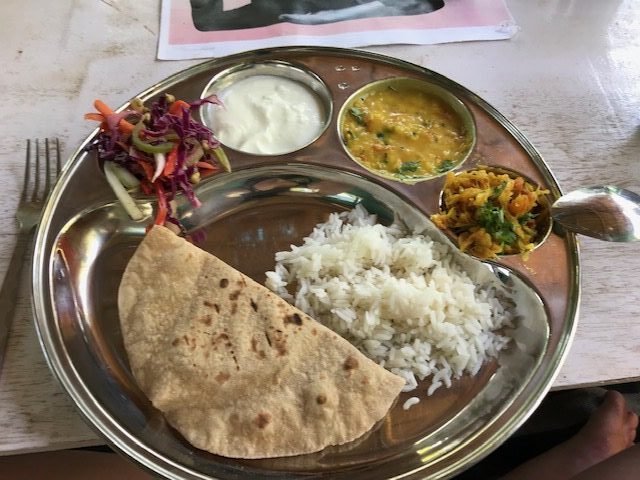The yogic (also called ayurvedic) nutrition is a millennium-old Indian wisdom. A healthy body as well as a clear mind can be achieved through yogic nutrition. Through healthy nutrition we can prevent diseases, prevent existing diseases from progressing and increase our quality of life.

What does the word Ayurveda mean?
Ayurveda is a traditional Indian healing art that is becoming more and more popular in our modern western lifestyle. Ayurveda has been used successfully for thousands of years and is a timeless science based on natural healing methods. The goal of Ayurvedic teaching is to detoxify the body and activate the self-healing powers. The balance between a healthy balanced diet and the spiritual condition is the key to a fulfilling life!
For whom the yogic diet is good?
Whether young or old, healthy or with complaints. Everyone can integrate Ayurveda into everyday life. It is never too late to change your diet and habits and live more consciously. Ayurveda does not mean to change the whole life. Daily rituals are enough to trigger small successes. Because the ayurvedic way of life gives you lightness and energy.
On which Indian theses is the yogic nutrition based on?
Hippocrates once said:
„All diseases begin in the gut.“
What does a healthy gut flora mean?
A healthy gut flora is the result of the interaction of various bacteria in the colon, which are responsible for the metabolic activity and our energy balance as well as the strength of the immune system. The composition of bacteria plays an important role and can change throughout life. For example, we provide our body with unsuitable food due to intolerances, suffer from permanent stress. An unfavorable composition of bacteria leads to incomplete digestion. This manifests itself in the following complaints: Constipation, flatulence, pain, or even diarrhea. This is called a dysbalance. This dysbalance can affect our immune system and cause allergies. How can I strengthen my immune system and prevent allergies or even autoimmune diseases?
The Doshas – THREE BIOENERGIES
Every human being brings with him/her a typical constitution of these three doshas at birth.
The concept of the Three Bioenergies. They consist of the 5 elements. The elements earth and water form the bioenergy Kapha. From water and fire the bioenergy Pitta is formed. And finally from air and space the bioenergy Vata.
Vata: dry, cold, irregular
Pitta: hot, oily, sharp/sour
Kapha: heavy, cold/moist, sweet
The sense of doshas in your body is very helpful in case of arising complaints.
Yogic diet: What kind of Ayurvedic type am I?
|
A |
B |
C |
|
Do you have a slight build? |
Would you describe yourself as athletic? |
Would you describe your body as firm or corpulent? |
|
Is your hair very thin or fine? |
Are you prone to inflammation? |
Are you overweight? |
|
Do you have more air in your belly? |
Do you love order or perfectionism? |
Do you avoid exercise rather than seeking it? |
|
Is your skin very dry? |
Do you digest well and can eat pretty much anything? |
Do you love rest? |
|
Do you often long for warmth? |
Do you have soft stools and diarrhea often? |
Do you often feel listless? |
|
Do you feel your mind is very agitated (mind whirling)? |
Are you plagued by nausea and heartburn? |
Do you often wish for the good old days back? |
|
Do you tend to have irregular bowel movements? |
Do you like to eat hearty or salty foods? |
Do you need a lot of structure and your time to do things? |
|
Are you quick to get nervous and restless? |
Do you have allergic reactions? |
Can you always be counted on? |
|
Are you anxious and worry about everything? |
Do you like cold drinks or ice cream? |
Do you dislike being pushed to make decisions? |
|
Do you find it hard to concentrate? |
Do you get angry when you are hungry? |
Is your digestion very sluggish? |
|
Are you easily influenced by the media? |
Do you have the feeling that you are always moving very fast? |
Are you prone to sinusitis? |
|
Is your sleep very restless? |
Do you tend to try to persuade others? |
Are you slow to get out of bed? |
|
Is your bowel movement rather dry? |
Are you very critical? |
Is your hair very thick and wavy? |
If you answered yes to most of the questions in block A, you are currently very influenced by the elements of air and space. Your Vata Dosha is out of balance. Regular warm meals stabilize you.
If you answered yes to most of the questions in block B, your Pitta Dosha is elevated. You have to consider the elements fire and water, cooling foods like cucumber, mint, coconut milk have a calming effect.
If you answered yes to most of the questions in block C, you want to pay more attention to the Kapha Doscha. The element earth and water is very present. You can balance the cold, heavy and sweet qualities by eating light, stimulating foods with sufficient spice, such as ginger, cayenne pepper and chili.
AGNI – The key to a beneficial nutrition
Ayurvedic nutrition teaches: Your inner organism constantly reacts to the external environment. Thus, health depends strongly on daily habits, diets. Your organism can only be stable if your digestive fire “AGNI” is balanced.
- Drink 2L of liquid daily
- Slowly increase fiber 30g a day.
- Eat 1 kiwi every day.
- Psyllium husks 1/2 teaspoon daily
- Incorporate probiotic foods
- Exercise in nature
- Bowel massages
- Warm foods allow enough time on the toilet
Self-healing through Food preparation according to type
Reducing diet / lifestyle changes
|
Vata |
Pitta |
Kapha |
|
Avoid meals that are too large |
Reduce acid, spicy and salty foods |
Drink 2L daily |
|
Well chewed is half digested |
Increase fluid intake |
Slowly increase fiber 30g a day. |
|
Eat with enough rest |
Use healing clay and psyllium |
Eat 1 kiwi every day |
|
Practice abdominal breathing |
Reduce oily and fatty foods |
Psyllium husks 1/2 teaspoon for 1 week |
|
Avoid chewing gum, carbonic acid |
Avoid alcohol and coffee for two weeks |
Integrate probiotic foods |
|
Regular exercise in the fresh air |
Exercise in nature |
|
|
Intestinal massages with oil |
Intestinal massages |
|
|
Hot water bottle, tea and warm water |
Warm Food |
How to balance your agni?
- Eat 2-3 meals a day, keep a fasting time at night from 13-16h
- Eat regularly at the same time
- Drink only warm water between meals
- Eat the richest meal at noon
